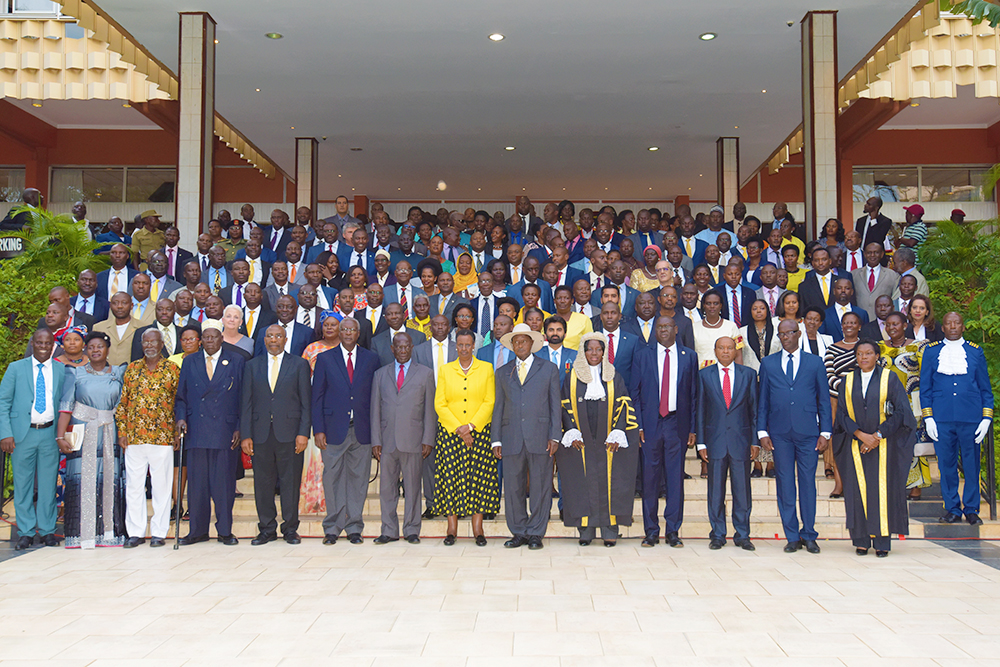
President Yoweri Museveni has, in his State of the Nation Address to Parliament at the Kampala Serena Conference Centre on Thursday 6 June 2019, pronounced seven major drivers of economic progress, saying the economy is on course to self-sustenance.
In his three hour address, Museveni said he is banking on industrialisation to promote export using agriculture, import substitution, the commencement of commercial production of oil and gas and strengthening local content.
Improving efficiency in the execution of public investment, harnessing the benefit of regional integration and skills development, said Museveni, constituted a firm foundation for economic development.
The President said the economy is now valued at US$29.5 billion with a per capita income of US$800, a 3.6 per cent increase in per capita growth over the last three decades.
“…between 1986 and 2015, Uganda was the 17th fastest growing economy in the whole world and 4th in Africa; if you remove the mineral countries, Uganda was 11th in the world and 1st in Africa,” said Museveni.
The head of state said the current factories count in Uganda is 4,900 up from 80 in 1986.
Since 2006, Uganda chose to heavily invest in infrastructure, which has since 2006 topped the budget priorities.
The sector has been allocated Shs6.4 trillion out of the Shs40.5 trillion national budget for Financial Year 2019/2020.
This huge financial basket in the sector is meant to bankroll oil infrastructure and open the Kabaale International Airport to aid tourism.
Museveni warned Opposition politicians against what he called misleading the population, berating those he says imagine they cannot be useful except when in government.
“If you claim that you are a leader and you do not care about your people, you are nothing I can tell you; do not tell me that you cannot help your people because you are not NRM….I can tell you on good authority,” said Museveni.
With the coming of the two Bombardier CRJ 900 planes meant to start the hitherto defunct national carrier, Museveni exuded confidence on the economy’s progress.
In apparent accountability, Museveni said the army has helped weed out criminals, and that the country will as a result remain secure.
“Some months ago, killers, robbers and rapists had been all over the place; the Police had been infiltrated by criminals and people who have been compromised in some way,” said Museveni.
These are claims he made last year after sacking the Inspector General Police, Gen. Edward Kale Kayihura and Lt. Gen. Henry Tumukunde, the Minister for Security.
“That crime wave will be defeated; UPDF works with the security forces to curtail the action of the criminals,” said Museveni.
A few days after his address on the State of the Nation, Arua Municipality MP Ibrahim Abiriga was brutally murdered, in a manner that was quickly becoming fashionable since the death of several Muslim clerics and security officials.
Cameras would later be installed to cover a wide pan of the metropolitan area, which was a key promise the Head of State made to Parliament at the height of the murder incidents then.
“The NRM government remains committed to ensuring a secure and peaceful Uganda by uplifting patriotism, democracy and good governance,” said Museveni.
Environment
Chief Administrative Officers and Sub-county Chiefs risk prosecution and jail, should they fail on a presidential directive to talk encroachers out of wetlands and file a progress report to the Presidency.
“I direct the CAOs and Chiefs to persuade these locals to leave the swamps and never come back; any CAO who does not act will be dismissed and charged with relevant criminal offences with the advice of the Attorney General,” said Museveni.
Article 101(1) requires the President to deliver an address on the State of the Nation, as a form of accountability for progress made and setbacks encountered in a financial year.
It is followed by the budget speech, which heralds a new session of Parliament and financial year.
